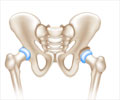Genetic testing helps determine safest dose of blood thinner, warfarin, for joint surgery patients to reduce complications.
- Genotype-guided dosing of warfarin prevents adverse complications.
- Clinically guided warfarin dosing can cause haemorrhage.
- Genotype-guided dosing of warfarin reduced the combined risk of major bleeding, venous thromboembolism, or death.
Researchers in the national study, which included clinicians from Intermountain Healthcare, found that when doctors dose according to a patient's genetic makeup when prescribing warfarin, a blood thinner commonly prescribed to prevent life-threatening blood clots, the numbers of adverse side effects like hemorrhage are significantly decreased.
Researchers say study findings from the GIFT study (Genetics Informatics Trial of Warfarin to Prevent Deep Venous Thrombosis) are significant. Compared to patients who received a standard dose, patients who received genetically-dosed warfarin had a 27 percent reduction in complications.
Specifically, their major bleeding was reduced by 75 percent, the incidence of excessive international normalized ratios was reduced by about 30 percent, and blood clots occurred 15 percent less often. No patients died during the study.
"In 2017, what I think GIFT shows us is that when we give warfarin based on an individual's genes, we can reduce their risk for adverse outcomes compared to using a standardized approach," Dr. Woller said. "What's uncertain now is how that observation can be pragmatically adopted clinically to provide cost-effective care."
Since 2007, the Food and Drug Administration has included language in its warfarin packaging that encourages the use of genetic guidance, if it's available.
This unique dosing is based in part on an individual's genetics, and great interest exists in understanding whether an individual's genetics can guide how to best prescribe warfarin to reach the optimal therapeutic range.
"Differences can be identified by looking at a patient's genetic makeup, and specifically at the genes that are responsible for the liver's metabolism of the drug," said Scott Woller, MD, co-director of the Thrombosis Program at Intermountain Medical Center and principal investigator for Intermountain Healthcare.
Patients in the trial were randomly assigned to one of two groups. One group received warfarin dosing based on standard factors such as age, height, and weight. The second group was dosed based on these clinical factors, plus genetic variants.
Previous studies have shown how the various genetic differences, called polymorphisms, affect the metabolism of warfarin, Dr. Woller said.
He noted that Brian F. Gage, MD, MSc, of Washington University, principal investigator for the entire GIFT study, played a significant role with other researchers in creating an algorithm that uses an individual's genetics to prescribe a more precise personalized dose of warfarin. The algorithm weighs individual patient characteristics, such as gender, weight, age and race, as well as one's genetics.
Genetic testing for personalized dosage
Dr. Woller said it's important to understand that the dose that will put a patient in the 2-3 international normalized ratio therapeutic range can vary greatly: Some patients require just 0.5 mg of warfarin a day, while others might require 15 to 20 mg a day.
"If we can identify the person who requires 0.5 mg, we'll start by giving them a low dose and it's less likely we'll overshoot," he said. "Likewise for the patient who requires 20 mg, we'll avoid lower dosing initially. Rather, we'd start by giving them significantly more because we know their stable warfarin dose will be higher."
"The challenge has always been cost-effectiveness, because you need to do genotyping on an individual and historically that hasn't been cheap," said Dr. Woller. "The day may come when patients go to the doctor, have their blood pressure taken, and then a cheek swab is used to genotype their whole genome. The information would be available in the future, if they needed warfarin to protect against blood clots or to guide the dosing of antibiotics dependent on genetics for metabolism, for example, or to assess personal risk for breast cancer."
Warfarin is a commonly prescribed, very effective anticlotting medicine -- but it's often associated with adverse complications and each patient requires a different dosage to achieve the desired treatment effect.
References
- Brian F. Gage, Anne R. Bass, Hannah Lin et al. Patients Undergoing Hip or Knee Arthroplasty - The GIFT Randomized Clinical Trial, JAMA https://jamanetwork.com/journals/jama/article-abstract/2654820
Source-Eurekalert
















